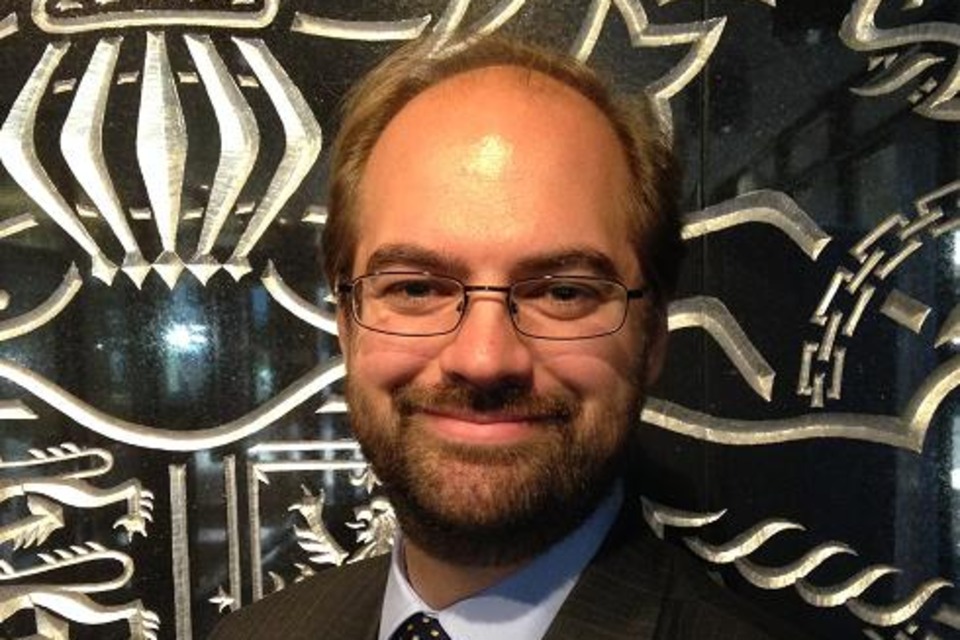Biological and Toxin Weapons Convention Article 5 Formal Consultative Meeting, September 2022: UK statement
At the BTWC meeting to discuss Russia’s unfounded allegations against the US and Ukraine, Ambassador Aidan Liddle gave the UK’s national statement debunking Russia’s claims.

Mr Chair, this process, as instigated by the Russian Federation, concerns issues at the very heart of this Convention. I’d like to start by reaffirming the United Kingdom’s longstanding and deeply-held commitment to the Biological and Toxin Weapons Convention, to actively strengthening this Convention, and to safeguarding against efforts to undermine it. We are committed to following the process for this Formal Consultative Meeting under Article V, fully and in good faith.
We must look at the wider context to Russia’s request. On 24 February Russia invaded Ukraine, an act of aggression in violation of international law, which the United Nations General Assembly voted overwhelmingly to deplore in the strongest terms. Since then the Russian Federation has repeatedly spread false narratives and disinformation to try and justify its illegal aggression, including wild and inconsistent claims involving dirty bombs, chemical weapons, and offensive biological research. It is against that backdrop that the credibility of Russia’s claims must be evaluated.
Mr Chair, Russia’s allegations refer to Articles I and IV of the BTWC. Many delegations have recalled precisely what these Articles require. But it is also worth recalling the first few lines of Article X: that “the States Parties to this Convention undertake to facilitate, and have the right to participate in, the fullest possible exchange of equipment, materials and scientific and technical information for the use of bacteriological (biological) agents and toxins for peaceful purposes.”
The United Kingdom’s experts have analysed the supporting evidence Russia has provided. I will share some key points from our assessment.
Firstly, Russia claims the culture collections held by Ukraine at the Mechnikov Anti-Plague Research Institute are inconsistent with peaceful, protective or prophylactic purposes, and are therefore evidence of a breach of Article I. This allegation is based on specific reference to 422 cholera ‘storage units’ and 32 anthrax ‘storage units’ and a lack of mass outbreaks of these diseases in Ukraine in recent years. The term ‘storage unit’ is ambiguous and misleading. These numbers of samples are to be expected given the presence of these pathogens in Ukraine and the surrounding region. Open source scientific research shows 32 incidents of anthrax infections in Ukraine between 1997 and 2022, and a cholera epidemic in Ukraine between 1994 and 1995. Such strain collections are relevant for research aimed at understanding outbreaks and combatting infectious diseases, not only for the benefit of Ukraine but also for global preparedness and response. Most importantly, the endemic status and previous outbreak history are not the only reason determining whether a research programme on a particular biological agent should take place. Other reasons could include responses to global health security, international research collaboration, infectious disease preparedness, prevention and response, and disease surveillance and monitoring.
All of these are relevant to the provisions of the BTWC, particularly Article X. The evidence that Russia has presented is not indicative of offensive biological warfare activities. Irrespective of the size of the cholera and anthrax culture collections at the Mechnikov Institute, their retention is justifiable and we assess that research in Ukraine in fact, supports the provisions of the BTWC, including Article X.
Secondly, Russia claims a scientific pre-proposal from the Kharkov Institute of Veterinary Medicine, to investigate the potential transmission of avian influenza in wild birds in Europe, and a presentation slide titled ‘Risk of Emerging Infections from Insectivorous Bats in Ukraine and Georgia’ are evidence that the United States and Ukraine were studying the spread of dangerous infections as a means of biological weapons agent delivery. These documents provide no evidence supporting those claims. The proposed projects are consistent with investigations, for peaceful purposes, of wildlife that transmit pathogens. These documents relate to scientific research designed to better understand disease transmission and contribute ultimately to mitigating these pathogens. There are many examples of these types of studies being conducted internationally, including by Russia. We assess this shows Ukraine and the United States upholding the provisions of the BTWC, including Article X.
Thirdly, Russia claims to have recovered drones with 30-litre reservoirs within Ukrainian territory that they allege can be used to spray ‘bioagents’. The only evidence Russia has provided is a letter from Baykar, a Turkish equipment manufacturer, in relation to export control regulations. The Russian claim that the drones have ‘the ability to be equipped with aerosol generating systems with a 20+ litre capacity’ is not actually supported by the documents provided. In fact, on the document, the manufacturer has explicitly written that the drones do not have this capacity. The drones referred to in the Russian documents appear to be of the type used for agriculture, manufactured by Chinese company DJI, supplied under the Chinese ‘Belt-and-Road’ initiative in collaboration with the Ukrainian government. Yet again, no evidence has been presented that demonstrates any non-compliance with the Convention by Ukraine.
Mr Chair, Russia has asked that we take their allegations seriously. It is hard to do so, when their presentation yesterday, delivered by a parade of nameless individuals, contains no more than misrepresentations of assorted public documents quoted incorrectly or out of context, and copy-pasted images from Wikipedia. This is not only an abuse of the time and resources States Parties have devoted to this meeting, in respect for the provisions of the Convention. It is a dangerous attempt to exploit the Convention for aggressive political purposes.
Nevertheless, we, along with all the delegations represented here, have listened carefully to the allegations presented by Russia, and to the exhaustive response given by the United States and Ukraine. We consider that Russia’s allegations have been duly heard, and that on considering their evidence no cause for ongoing concern about compliance with the Convention remains. In our view this process has served its proper purpose and should be concluded.